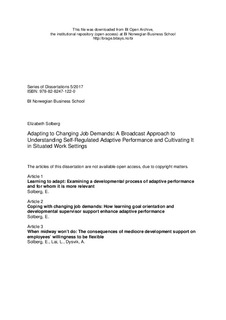| dc.description.abstract | Although employees’ “adaptive performance” is increasingly important for maintaining both individual job performance and contributing to organizational performance, there continues to be only a superficial understanding of how, why, and when employees’ adapt to changing job demands in situated work settings (Jundt, Shoss, & Huang, 2015). The dissertation applies a broadcast method to extend understanding in this area, in that it includes three independent field studies that each elaborate a different process, and thus a different set of mechanisms that should be important for producing adaptive performance, enhancing the effectiveness of this behavior, and eliciting employees’ willingness to display it at work.
The three studies distinctly contribute to a better understanding of the mechanisms that underlie adaptive performance and factors that facilitate it in situated work settings. Combined they sow the seeds upon which a better understanding of adaptive performance as self-regulated behavior can grow. Specifically, this dissertation contributes to a budding view of adaptive performance as self-regulated behavior (e.g., Chen & Firth, 2014; Jundt & Shoss, 2013), by providing preliminary insight into the self-regulated skill and behavioral revision processes that occurs as employees encounter and adapt to changing job demands, the self-regulated goal-striving and coping patterns that enable effective adaptive performance when changing job demands are high, and the ways in which external demands to adapt to changes at work become internalized, and therefore self-regulated.
Second, the three studies collectively underline the need for supervisors to self-regulate their own behavior in order to provide the support important for developing adaptive performance to those employees who are less open to work change, less learning-oriented, and less intrinsically motivated.
Thus, the dissertation appeals to research calling for managers to look beyond selection and staffing systems to provide the organization with adaptable employees, and take greater responsibility for cultivating self-regulated adaptive performance among existing staff – particularly those employees who are vulnerable to changing job demands (Moss, Dowling, & Callanan, 2009). | nb_NO |
